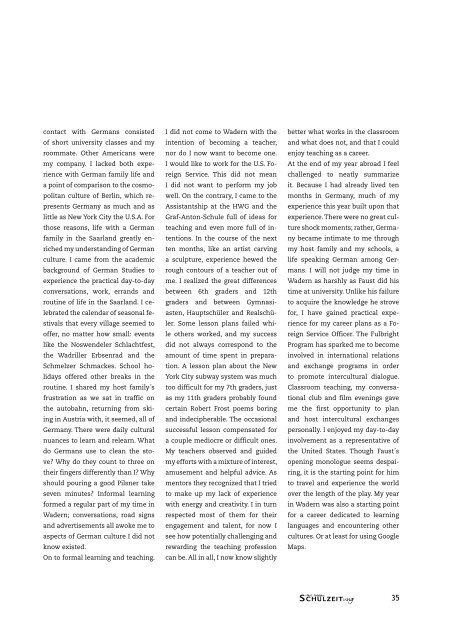PDF Download (11,7 MB) - Michael Siffrin
PDF Download (11,7 MB) - Michael Siffrin
PDF Download (11,7 MB) - Michael Siffrin
Sie wollen auch ein ePaper? Erhöhen Sie die Reichweite Ihrer Titel.
YUMPU macht aus Druck-PDFs automatisch weboptimierte ePaper, die Google liebt.
contact with Germans consisted<br />
of short university classes and my<br />
roommate. Other Americans were<br />
my company. I lacked both experience<br />
with German family life and<br />
a point of comparison to the cosmopolitan<br />
culture of Berlin, which represents<br />
Germany as much and as<br />
little as New York City the U.S.A. For<br />
those reasons, life with a German<br />
family in the Saarland greatly enriched<br />
my understanding of German<br />
culture. I came from the academic<br />
background of German Studies to<br />
experience the practical day-to-day<br />
conversations, work, errands and<br />
routine of life in the Saarland. I celebrated<br />
the calendar of seasonal festivals<br />
that every village seemed to<br />
offer, no matter how small: events<br />
like the Noswendeler Schlachtfest,<br />
the Wadriller Erbsenrad and the<br />
Schmelzer Schmackes. School holidays<br />
offered other breaks in the<br />
routine. I shared my host family´s<br />
frustration as we sat in traffic on<br />
the autobahn, returning from skiing<br />
in Austria with, it seemed, all of<br />
Germany. There were daily cultural<br />
nuances to learn and relearn. What<br />
do Germans use to clean the stove?<br />
Why do they count to three on<br />
their fingers differently than I? Why<br />
should pouring a good Pilsner take<br />
seven minutes? Informal learning<br />
formed a regular part of my time in<br />
Wadern; conversations, road signs<br />
and advertisements all awoke me to<br />
aspects of German culture I did not<br />
know existed.<br />
On to formal learning and teaching.<br />
I did not come to Wadern with the<br />
intention of becoming a teacher,<br />
nor do I now want to become one.<br />
I would like to work for the U.S. Foreign<br />
Service. This did not mean<br />
I did not want to perform my job<br />
well. On the contrary, I came to the<br />
Assistantship at the HWG and the<br />
Graf-Anton-Schule full of ideas for<br />
teaching and even more full of intentions.<br />
In the course of the next<br />
ten months, like an artist carving<br />
a sculpture, experience hewed the<br />
rough contours of a teacher out of<br />
me. I realized the great differences<br />
between 6th graders and 12th<br />
graders and between Gymnasiasten,<br />
Hauptschüler and Realschüler.<br />
Some lesson plans failed while<br />
others worked, and my success<br />
did not always correspond to the<br />
amount of time spent in preparation.<br />
A lesson plan about the New<br />
York City subway system was much<br />
too difficult for my 7th graders, just<br />
as my <strong>11</strong>th graders probably found<br />
certain Robert Frost poems boring<br />
and indecipherable. The occasional<br />
successful lesson compensated for<br />
a couple mediocre or difficult ones.<br />
My teachers observed and guided<br />
my efforts with a mixture of interest,<br />
amusement and helpful advice. As<br />
mentors they recognized that I tried<br />
to make up my lack of experience<br />
with energy and creativity. I in turn<br />
respected most of them for their<br />
engagement and talent, for now I<br />
see how potentially challenging and<br />
rewarding the teaching profession<br />
can be. All in all, I now know slightly<br />
better what works in the classroom<br />
and what does not, and that I could<br />
enjoy teaching as a career.<br />
At the end of my year abroad I feel<br />
challenged to neatly summarize<br />
it. Because I had already lived ten<br />
months in Germany, much of my<br />
experience this year built upon that<br />
experience. There were no great culture<br />
shock moments; rather, Germany<br />
became intimate to me through<br />
my host family and my schools, a<br />
life speaking German among Germans.<br />
I will not judge my time in<br />
Wadern as harshly as Faust did his<br />
time at university. Unlike his failure<br />
to acquire the knowledge he strove<br />
for, I have gained practical experience<br />
for my career plans as a Foreign<br />
Service Officer. The Fulbright<br />
Program has sparked me to become<br />
involved in international relations<br />
and exchange programs in order<br />
to promote intercultural dialogue.<br />
Classroom teaching, my conversational<br />
club and film evenings gave<br />
me the first opportunity to plan<br />
and host intercultural exchanges<br />
personally. I enjoyed my day-to-day<br />
involvement as a representative of<br />
the United States. Though Faust´s<br />
opening monologue seems despairing,<br />
it is the starting point for him<br />
to travel and experience the world<br />
over the length of the play. My year<br />
in Wadern was also a starting point<br />
for a career dedicated to learning<br />
languages and encountering other<br />
cultures. Or at least for using Google<br />
Maps.<br />
35


